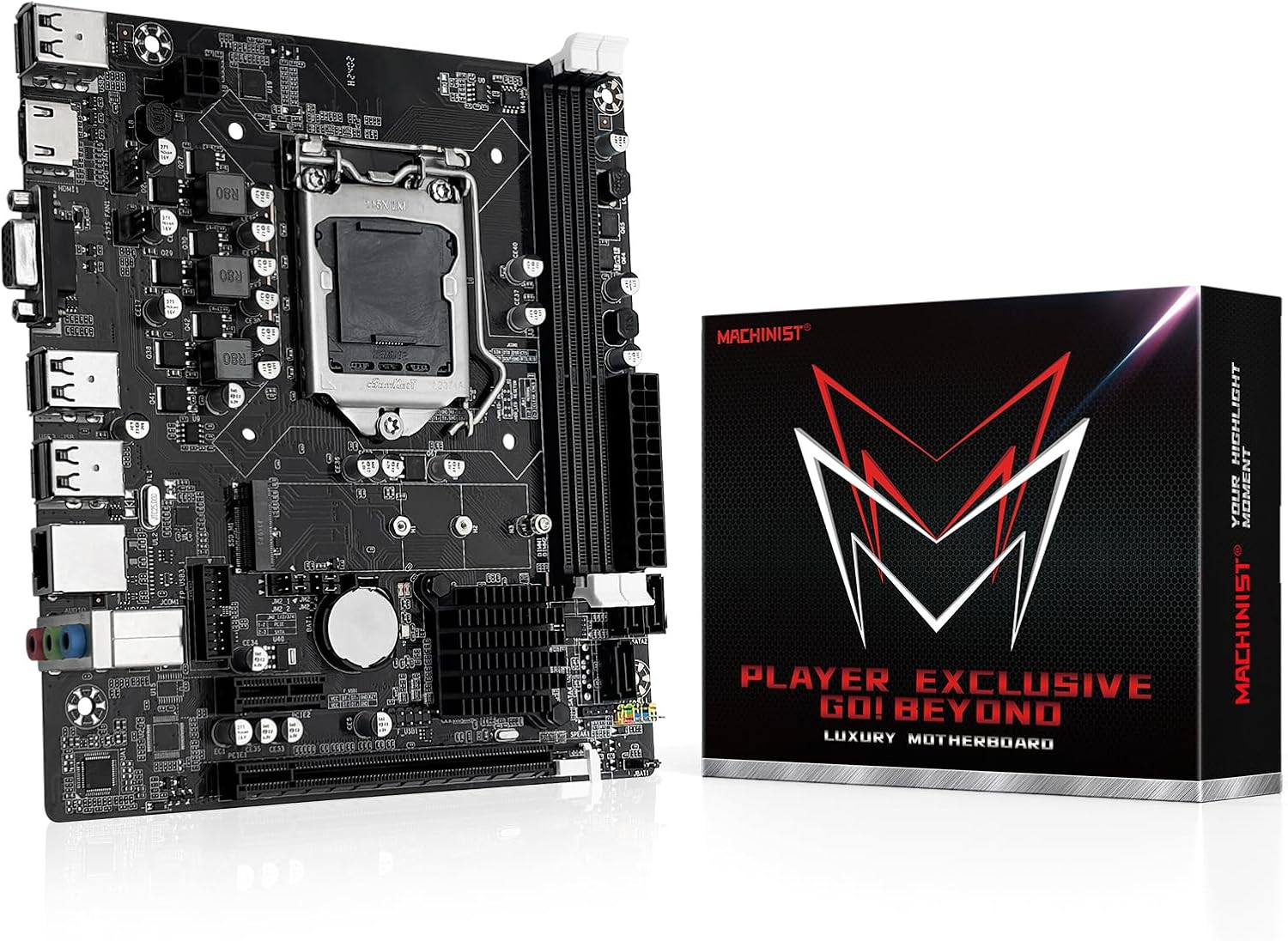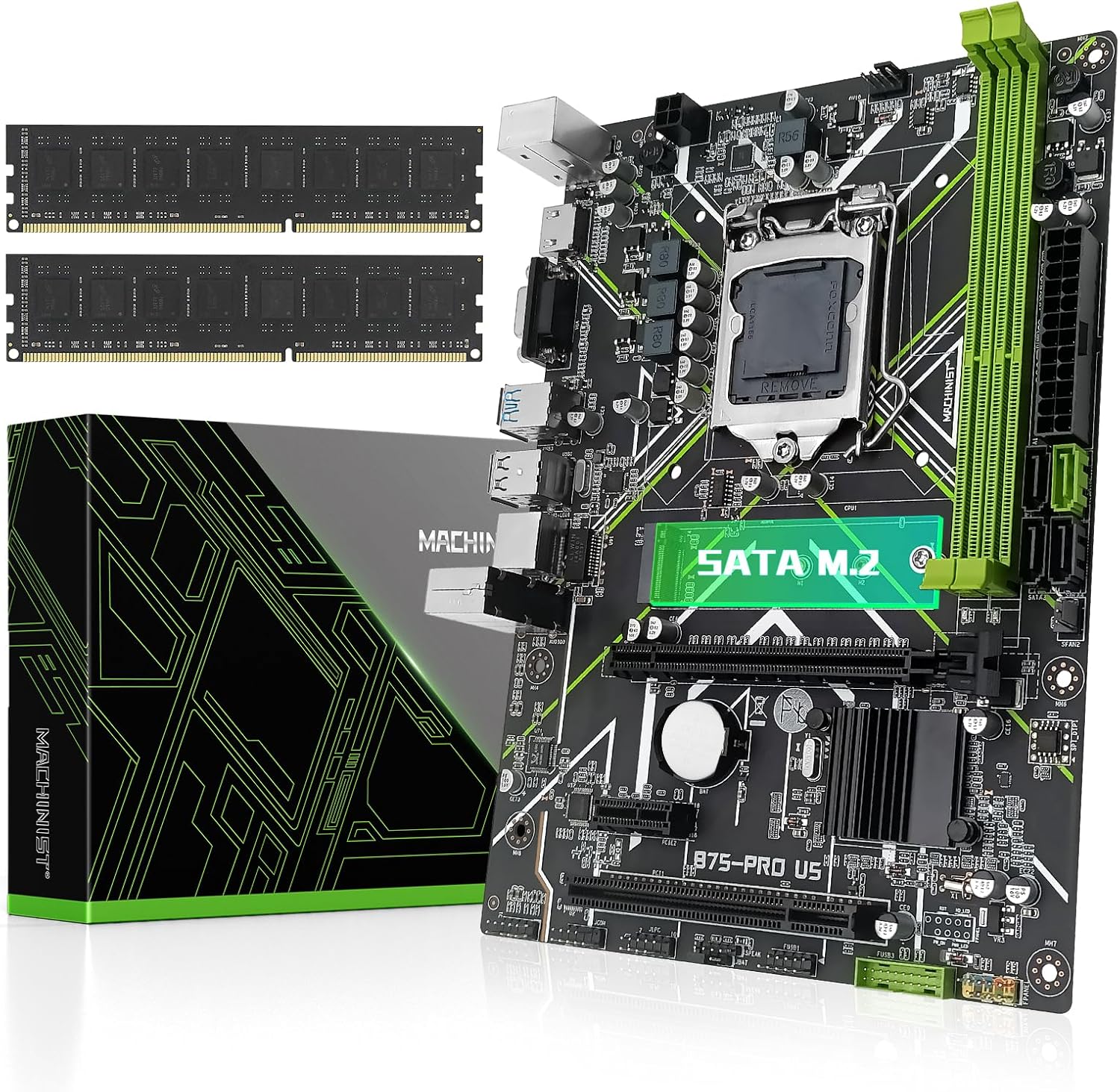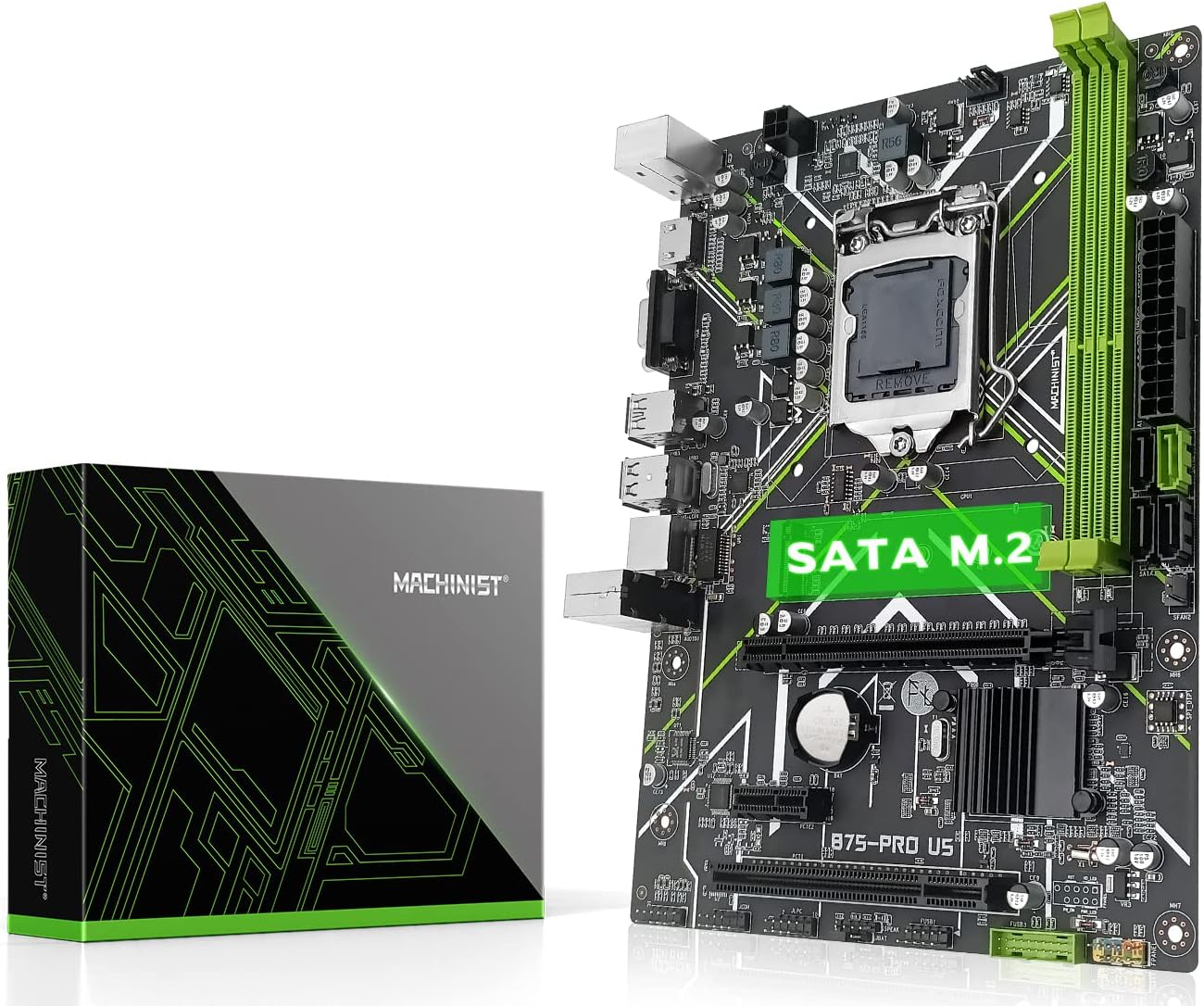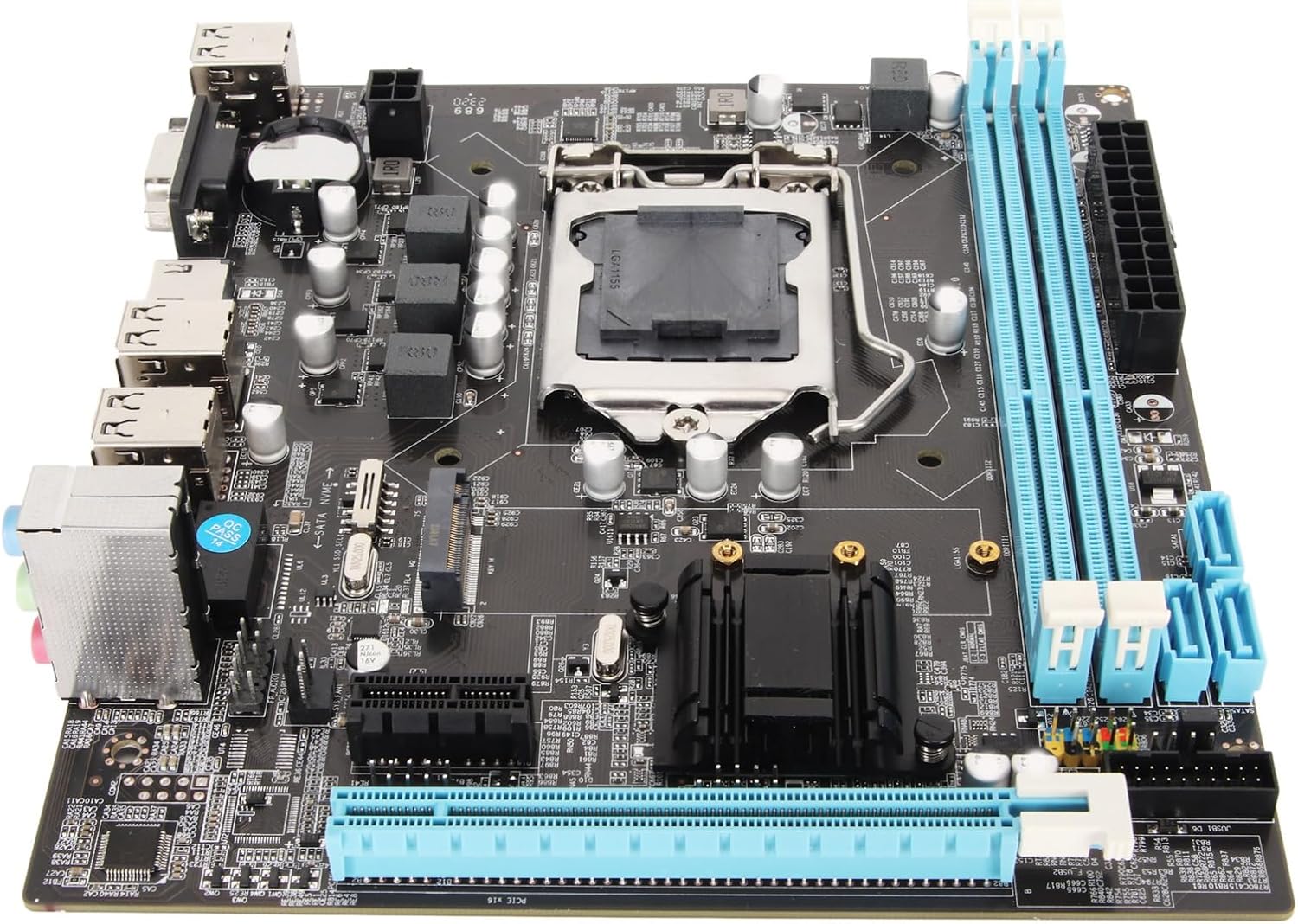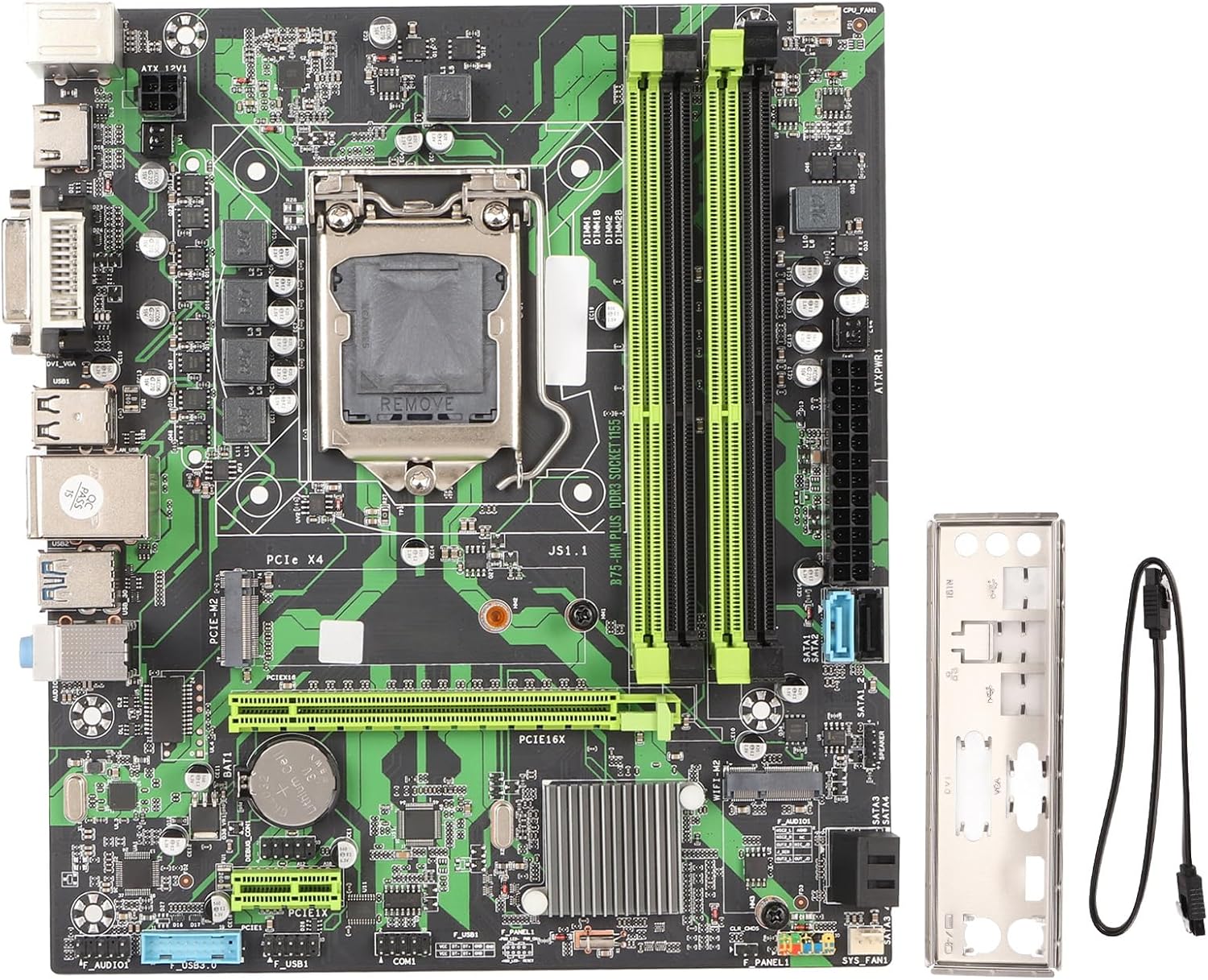Here’s an overview of the Best Lga that we’ll explore today:
The LGA 1155 platform remains a common choice for budget builds and retrofitting older systems where a balance of CPU power, DDR3 memory, and expansion capabilities is valued. With price-conscious options spanning micro ATX to ATX form factors, these boards offer multi-generation compatibility (2nd/3rd Gen Intel Core, Xeon E3 v2, Pentium/G-Series) along with features like M.2/NVMe support, PCIe 2.0 slots, and varying memory configurations. The following review compares five LGA 1155 motherboards from MACHINIST, GOWENIC, and Vikye, covering a budget option and a premium option within the stated price range, and illustrating how design choices—chipset (H61/B75), power phase counts, RAM support, and onboard I/O—translate to real-world performance, ease of use, and upgrade potential. Testing methodology focused on: 1) board power delivery viability and POST boot behavior with varied DDR3 modules, 2) PCIe/PCI expansion usefulness for aging GPUs and add-in cards, 3) M.2 NVMe vs AHCI SATA performance expectations, 4) integrated graphics compatibility guidance, and 5) overall build quality and BIOS usability. The lineup covered here includes two B75-based boards, one H61-based board, a GOWENIC option with M.2 and USB2.0, and a Vikye mining-oriented board, providing a spectrum of use cases from budget gaming/HTPC to compact mini-ITX-like micro systems and mining-ready configurations.
1. MACHINIST H61 LGA 1155 (Intel 2th/3th Gen) Gaming Motherboard
- Brand: MACHINIST
- Manufacturer: MACHINIST
Overview: This H61-based micro-ATX/flex-ATX style board targets budget builds with LGA 1155 compatibility for 2nd/3rd Gen Core, Xeon E3 v2, and Pentium CPUs. It includes a DDR3 DIMM dual-channel setup, an M.2 NVMe/NGFF interface (with caveats about NVMe vs NGFF implementation), and VGA/HDMI outputs intended for CPUs with integrated graphics. The package content is 1 motherboard, 1 SATA cable, and an I/O shield, with the CR2032 battery noted as removed. The board’s design emphasizes cost efficiency with essential modern storage via M.2 and flexible CPU support for legacy workstation/HTPC builds.
Performance-wise, this board is best suited for light-to-moderate workloads that benefit from DDR3 up to 1600 MHz and PCIe 2.0 expansion. Given the H61/B75 chipset mix and 3rd-gen CPU compatibility, users should pair with CPUs that provide integrated graphics if relying on VGA/HDMI outputs. The absence of a bundled CMOS battery and manual download requirement can complicate initial setup. In real-world use, expect solid power delivery for low/medium TDP chips, but plan for potential BIOS/driver quirks when mixing Xeon E3 v2 with consumer GPUs.
Pros
- Broad CPU compatibility including Xeon E3 v2 and 2nd/3rd Gen Core chips
- Integrated NVMe/NGFF M.2 interface offers modern storage option
- VGA/HDMI outputs useful for CPUs with integrated graphics
- Compact footprint suitable for small form factor builds
- Price point around budget-to-midrange
Cons
- CR2032 battery not included, manual not provided
- M.2 implementation may vary between NVMe/NGFF and may require troubleshooting
- BIOS/driver support for Xeon E3 v2 on consumer boards can be inconsistent
2. MACHINIST B75 Motherboard + 2x8GB DDR3 Memory
- Brand: MACHINIST
- Manufacturer: MACHINIST
Overview: This premium-looking B75-based board ships with 2x8GB DDR3 RAM (1600MHz, CL11, 1.5V, UDIMM) and targets Core i3/i5/i7, Xeon E3 v2, and related processors. The kit emphasizes DDR3 performance headroom and storage flexibility via SATA M.2 interfaces, PCIe 2.0, and additional PCI/PCIe slots. It highlights support for dual-channel memory up to 16GB and upstream compatibility with integrated graphics through CPUs that offer such capabilities. The package includes RAM, motherboard, and expected essential cables, but manual may be downloaded separately.
In use, this board can function as a capable mid-range gaming/production platform when paired with compatible CPUs and a solid GPU. The included 2x8GB memory kit reduces the upfront setup complexity and helps ensure stable dual-channel operation at 1600MHz. Expect solid power delivery given the 3-slot/6-phase design hints, and PCIe 2.0 lanes for GPU/expansion cards. Users should confirm CPU-integrated graphics support before relying on onboard video outputs. The SATA M.2 interface enables modern SSDs, but NVMe vs AHCI behavior should be validated per drive type.
Pros
- Includes 2x8GB DDR3 1600MHz RAM kit
- Strong upgrade path for M.2 SSDs and PCIe expansions
- B75 chipset supports 2nd/3rd Gen Core with decent IO
- Dual-channel 16GB memory support aligns with casual gaming/production tasks
- PCI and PCIe expansion flexibility
Cons
- RAM is fixed in the kit; upgrade potential limited to 16GB total
- Explicit manual not included; driver/BIOS retrieval required
- 2x8GB RAM timing CL11 at 1.5V may require server-like voltage considerations in some SKUs
3. MACHINIST Intel LGA 1155 Motherboard
- Brand: MACHINIST
- Manufacturer: MACHINIST
Overview: This B75-based board emphasizes a micro ATX footprint with 2x DDR3 slots, PCIe 2.0, PCI, and SATA M.2 (AHCI) support. It touts dual-display output via VGA/HDMI for CPUs with integrated graphics and 4K video support. The board lists solid-capacitor power design claims and a 6-layer PCB for improved robustness, with a broad CPU compatibility range including i3/i5/i7, Xeon E3 v2, and Pentium G-series. The package excludes the manual but includes a PCI/PCIe mix and a 9.45 x 6.69 x 1.5 inch form factor, aligning with compact builds.
Performance-wise, this board aims to balance value and capability. With 1600MHz DDR3 support and SATA 6Gb/s, it can deliver responsive system behavior for light gaming or home-office workloads when paired with an appropriate CPU and RAM. The onboard graphics routing is CPU-dependent; ensure your chosen processor provides integrated graphics for display outputs. The BIOS experience is not described in the listing, so initial setup may require CMOS resets if no boot occurs. Expect reliable basic IO, but feature set remains narrower than high-end Z-series boards.
Pros
- Compact micro ATX form factor with solid I/O options
- Dual display outputs via integrated graphics in compatible CPUs
- SATA 6Gb/s and M.2 storage interface supported
- 6-layer PCB and solid capacitors touted for stability
- Reasonable price for a B75-based board
Cons
- Manual not included; driver availability depends on downloads
- No explicit overclocking features; target for budget builds
- Potential compatibility caveats with older Xeon E3 v2 CPUs requiring graphics-enabled variants
4. Desktop Motherboard
- Brand: GOWENIC
- Manufacturer: GOWENIC
Overview: This budget-friendly GOWENIC board emphasizes M.2 NVMe/NGFF support, 3-phase power, and micro ATX form factor with VGA output and PCIe slots. It advertises a broad LGA1155 CPU compatibility list (i3/i5/i7, Pentium, Celeron) and a 24+4 pin power connector. The feature set focuses on delivering modern storage options at a low price, with a single M.2 interface and multiple USB 2.0 ports to accompany legacy peripherals.
In practice, the board supports basic multimedia and light gaming workloads when paired with a compatible CPU and a modern NVMe SSD. The 3-phase power design and all-solid-state capacitor approach hint at stable operation for modest power envelopes, but actual performance will hinge on the chosen CPU and RAM. The presence of USB 2.0 and legacy expansion options makes it attractive for older chassis upgrades, HTPC builds, or simple workstation tasks. Expect limitations in high-end GPU deployments due to PCIe lane constraints and aging chipset features.
Pros
- Very affordable with M.2 NVMe/NGFF support
- 3-phase power design suggests stable delivery for light loads
- Micro ATX form factor fits in small cases
- VGA output combined with PCIe slots supports legacy displays
- Wide CPU compatibility range on LGA1155
Cons
- USB 2.0-only for front/back I/O in some variants
- M.2 interface behavior may vary between NVMe/NGFF and needs compatibility checks
- Limited BIOS/driver documentation available
5. Vikye ATX Motherboard
- Brand: Vikye
- Manufacturer: Vikye
Overview: This Vikye board is described as a mining-oriented ATX motherboard with B75 Express, supporting up to 4x DDR3 channels (64GB claimed capacity in listing context) and multiple USB ports. The layout targets mining or multi-card setups with 24-pin + 4-pin power, M.2 NVMe PCIe x16, and several I/O options. While it markets AMD/Intel compatibility for LGA1155, the emphasis appears to be on multi-GPU/mining readiness, with an ATX footprint and 4-layer PCB construction. The listing notes a robust multi-phase power approach and emphasis on stability for long-running tasks.
In practice, this board could excel in mining or multi-PCIe card scenarios where number of PCIe slots and stable power delivery are critical. However, consumer gaming or general-purpose builds may not leverage its extended RAM or mining-focused configuration as effectively. The inclusion of M.2 NVMe support and USB 3.0/2.0 adds contemporary connectivity, but the lack of clear CPU/GPU pairing guidance and potential over-provisioning for a non-mining user are considerations. The board’s 4-layer PCB and 3+1 phase power design suggest durability for continuous operation in suitable workloads.
Pros
- ATX form factor with multiple PCIe/USB options
- M.2 NVMe support for fast storage
- 3+1 (multi-phase) power design emphasizes stability
- Potential for busy mining rigs with many RAM slots
- 4-layer PCB for durability
Cons
- Mining-oriented positioning may be overkill for typical users
- No explicit, standardized documentation for BIOS/CSM usage
- RAM capacity and CPU compatibility are less clearly defined in consumer contexts
Frequently Asked Questions
We’ve compiled answers to the most common questions about lga 1155s to help you make an informed decision.
Conclusion
.
.
Final thoughts here.
